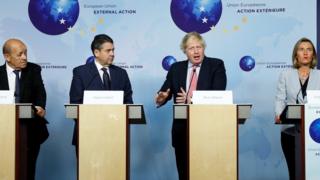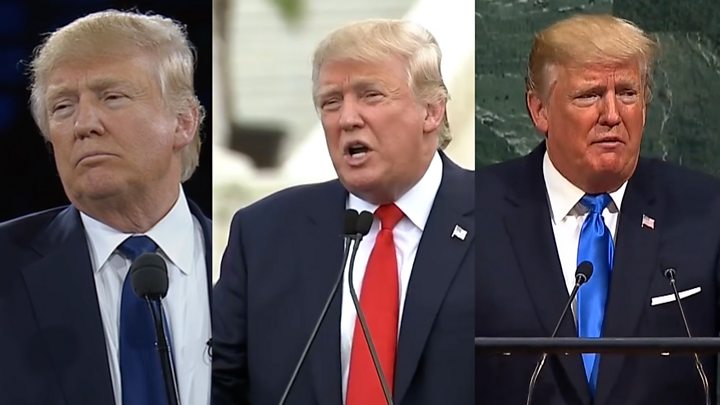[ad_1]
 Image copyright
Image copyright
Reuters
Boris Johnson (second from right) said the deal was preventing Iran acquiring a military nuclear capability
UK Foreign Secretary Boris Johnson has challenged the US to show there is a better alternative to the deal with Iran that limits its nuclear programme.
Following talks in Brussels with his Iranian and European counterparts, he said the 2015 accord was a considerable accomplishment that was preventing Iran acquiring nuclear weapons.
Mr Johnson stressed that Iran was fully in compliance with it.
US President Donald Trump wants to amend the deal or withdraw from it.
In October, he refused to recertify for Congress that Iran was complying, accusing it of “not living up to the spirit” of the agreement.

Media playback is unsupported on your device
He is expected to decide on Friday whether to extend relief from the US economic sanctions imposed on Iran that former President Barack Obama authorised.
The sanctions had cut Iran’s central bank out of the international financial system and imposed penalties for buying Iranian oil, crippling the country’s economy.
At a news conference after meeting Iranian Foreign Minister Mohammad Javad Zarif on Thursday, representatives of the EU, the UK, France and Germany reiterated their support for the nuclear deal they helped negotiate.
“The deal is working, it is delivering on its main goal which means keeping the Iranian nuclear programme in check and under close surveillance,” EU foreign policy chief Federica Mogherini said.
“The unity of the international community is essential to preserve a deal that is working, that is making the world safer and that is preventing potential nuclear arms race in the region. And we expect all parties to continue to fully implement this agreement,” she added.
Mr Johnson described the deal, which is known formally as the Joint Comprehensive Plan of Action (JCPOA), as a “considerable diplomatic accomplishment”.
“I don’t think that anybody has produced a better alternative to the JCPOA as a way of preventing the Iranians from going ahead with the acquisition of a military nuclear capability,” he said.
“It is incumbent on those who oppose the JCPOA to come up with that better solution, because we have not seen it so far.”
Mr Trump is reportedly seeking an end to the deal’s “sunset clauses”, one of which allows for the lifting of restrictions on Iran’s uranium enrichment programme after 2025. While enriched uranium is used as fuel for nuclear reactors, it can also be used to make nuclear weapons.
Image copyright
AFP
Iran rejects US assertions that its ballistic missiles are designed to carry nuclear warheads
The European ministers expressed concerns about Iran’s ballistic missile programme and involvement in regional conflicts, but said they should be kept separate from the nuclear deal.
The US says Iranian ballistic missile tests conducted in the past year have violated a UN Security Council resolution.
Iran says the missiles it has tested are not designed to carry nuclear warheads and insists its nuclear programme is entirely peaceful.
[ad_2]
Source link












